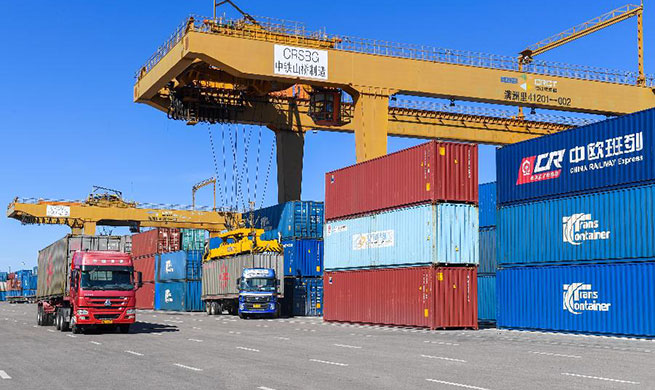SEOUL, June 5 (Xinhua) -- South Korea posted a current account deficit in seven years as the export fall resulted in a reduced trade surplus amid the seasonal factors such as the stock dividend payment to foreign investors, central bank data showed Wednesday.
Current account balance was a deficit of 660 million U.S. dollars in April, turning into the red for the first time since the same month of 2012, according to the Bank of Korea (BOK).
The current account balance refers to the broadest measure of cross-border trade that includes trade balances for goods and services as well as capital flow to and from the country.
The downturn was mainly attributed to the continued fall in export, which accounts for about half of the economy.
The export contracted 6.2 percent over the year to 48.3 billion dollars in April, keeping a downward momentum for the fifth consecutive month.
Import rose 1.8 percent to 42.63 billion dollars in the same period, sending the trade surplus to 5.67 billion dollars. It was down from a surplus of 9.62 billion dollars recorded a year earlier.
For the first four months of this year, the outbound shipment amounted to 185.8 billion dollars, down 7.8 percent compared with the same period of last year.
Import shrank 5.3 percent to 160.52 billion dollars during the January-April period. The trade surplus came to 25.28 billion dollars in the four-month period.
The export reduction stemmed from the downward cycle of the global semiconductor industry and the global trade weakness, caused by the U.S. protectionist moves.
Expectations ran relatively low for the export rebound.
The stock dividend payment to foreign investors contributed to the current account deficit in seven years. According to the BOK calculation, the country posted a current account surplus of 3.36 billion dollars in April when excluding the dividend payment.
In May, South Korea may have recorded a current account surplus, the BOK estimated.
Primary income account, which includes monthly salary and investment income such as dividend, logged a deficit of 4.33 billion dollars in April.
The April figure surged from a deficit of 740 million dollars in March. The dividend income account posted a deficit of 4.99 billion dollars in April, marking the third-biggest ever recorded by the economy.
The services account balance, which measures the flow of travel, transport costs and royalties, registered a deficit of 1.43 billion dollars in April.
Despite the seasonal factors such as a rising number of overseas trips by residents, the April services account deficit was the lowest in 26 months on the faster rise in the number of foreign tourists visiting South Korea.
The travel income reached 1.7 billion dollars in April, marking the biggest in about four and a half years amid the rising number of Chinese and Japanese travelers to the country.
Financial account, which gauges cross-border capital flow without transactions in goods and services, logged a net outflow of 380 million dollars in April.
Overseas direct investment by local residents gained 3.84 billion dollars, while direct investment in the country by foreigners grew 280 million dollars.
For the portfolio investment, which includes stock and bond transactions, overseas investment by residents climbed 5.34 billion dollars. Foreign investment in local stocks and bonds increased 2.04 billion dollars in the month.













